#jacobin
Text
When the app tries to make you robo-scab
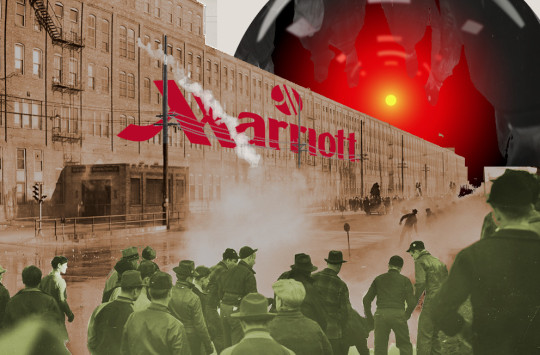
When we talk about the abusive nature of gig work, there’s some obvious targets, like algorithmic wage discrimination, where two workers are paid different rates for the same job, in order to trick occasional gig-workers to give up their other sources of income and become entirely dependent on the app:
https://pluralistic.net/2023/04/12/algorithmic-wage-discrimination/#fishers-of-men
Then there’s the opacity — imagine if your boss refused to tell you how much you’ll get paid for a job until after you’ve completed it, claimed that this was done in order to “protect privacy” — and then threatened anyone who helped you figure out the true wage on offer:
https://pluralistic.net/2021/08/07/hr-4193/#boss-app
Opacity is wage theft’s handmaiden: every gig worker producing content for a social media algorithm is subject to having their reach — and hence their pay — cut based on the unaccountable, inscrutable decisions of a content moderation system:
https://pluralistic.net/2022/12/10/e2e/#the-censors-pen
Making content for an algorithm is like having a boss that docks every paycheck because you broke rules that you are not allowed to know, because if you knew the rules, you’d figure out how to cheat without your boss catching you. Content moderation is the last place where security through obscurity is considered good practice:
https://doctorow.medium.com/como-is-infosec-307f87004563
When workers seize the means of computation, amazing things happen. In Indonesia, gig workers create and trade tuyul apps that let them unilaterally modify the way that their bosses’ systems see them — everything from GPS spoofing to accessibility mods:
https://pluralistic.net/2021/07/08/tuyul-apps/#gojek
So the tech and labor story isn’t wholly grim: there are lots of ways that tech can enhance labor struggles, letting workers collaborate and coordinate. Without digital systems, we wouldn’t have the Hot Strike Summer:
https://pluralistic.net/2022/12/02/not-what-it-does/#who-it-does-it-to
As the historic writer/actor strike shows us, the resurgent labor movement and the senescent forces of crapulent capitalism are locked in a death-struggle over not just what digital tools do, but who they do it for and who they do it to:
https://locusmag.com/2022/01/cory-doctorow-science-fiction-is-a-luddite-literature/
When it comes to the epic fight over who technology acts for and against, we need a diversity of tactics, backstopped by tech operated by and for its users — and by laws that protect workers and the public. That dynamic is in sharp focus in UNITE Here Local 11’s strike against Orange County’s Laguna Cliffs Marriott Resort & Spa.
The UNITE Here strike turns on the usual issues like a living wage (hotel staff are paid so little they have to rent rooming-house beds by the shift, paying for the right to sleep in a room for a few hours at a time, without any permanent accommodation). They’re also seeking health-care and pensions, so they can be healthy at work and retire after long service. Finally, they’re seeking their employer’s support for LA’s Responsible Hotels Ordinance, which would levy a tax on hotel rooms to help pay for hotel workers’ housing costs (a hotel worker who can’t afford a bed is the equivalent of a fast food worker who has to apply for food stamps):
https://www.unitehere11.org/responsible-hotels-ordinance/
But the Marriott — which is owned by the University of California and managed by Aimbridge Hospitality — has refused to bargain, walking out negotiations.
But the employer didn’t walk out over wages, benefits or support for a housing subsidy. They walked out when workers demanded that the scabs that the company was trying to hire to break the strike be given full time, union jobs.
These aren’t just any scabs, either. They’re predominantly Black workers who rely on the $700m Instawork app for gigs. These workers are being dispatched to cross the picket line without any warning that they’re being contracted as strikebreakers. When workers refuse the cross the picket and join the strike, Instawork cancels all their shifts and permanently blocks them from new jobs.
This is a new, technologically supercharged form of illegal strikebreaking. It’s one thing for a single boss to punish a worker who refuses to scab, but Instawork acts as a plausible-deniability filter for all the major employers in the region. Like the landlord apps that allow landlords to illegally fix rents by coordinating hikes, Instawork lets bosses illegally collude to rig wages by coordinating a blocklist of workers who refuse to scab:
https://arstechnica.com/tech-policy/2022/10/company-that-makes-rent-setting-software-for-landlords-sued-for-collusion/?comments=1
The racial dimension is really important here: the Marriott has a longstanding de facto policy of refusing to hire Black workers, and whenever they are confronted with this, they insist that there are no qualified Black workers in the labor pool. But as soon as the predominantly Latino workforce struck, Marriott discovered a vast Black workforce that it could coerce into scabbing, in collusion with Instawork.
Now, all of this isn’t just sleazy, it’s illegal, a violation of Section 7 of the NLRB Act. Historically, that wouldn’t have mattered, because a string of presidents, R and D, have appointed useless do-nothing ghouls to run the NLRB. But the Biden admin, pushed by the party’s left wing, made a string of historic, excellent appointments, including NLRB General Counsel Jennifer Abruzzo, who has set her sights on punishing gig work companies for flouting labor law:
https://pluralistic.net/2022/01/10/see-you-in-the-funny-papers/#bidens-legacy
UNITE HERE 11 has brought a case to the NLRB, charging the Instawork, the UC system, Marriott, and Aimbridge with violating labor law by blackmailing gig workers into crossing the picket line. The union is also asking the NLRB to punish the companies for failing to protect workers from violent retaliation from the wealthy hotel guests who have punched them and screamed epithets at them. The hotel has refused to identify these thug guests so that the workers they assaulted can swear out complaints against them.
Writing about the strike for Jacobin, Alex N Press tells the story of Thomas Bradley, a Black worker who was struck off all Instawork shifts for refusing to cross the picket line and joining it instead:
https://jacobin.com/2023/07/southern-california-hotel-workers-strike-automated-management-unite-here
Bradley’s case is exhibit A in the UNITE HERE 11 case before the NLRB. He has a degree in culinary arts, but racial discrimination in the industry has kept him stuck in gig and temp jobs ever since he graduated, nearly a quarter century ago. Bradley lived out of his car, but that was repossessed while he slept in a hotel room that UNITE HERE 11 fundraised for him, leaving him homeless and bereft of all his worldly possessions.
With UNITE HERE 11’s help, Bradley’s secured a job at the downtown LA Westin Bonaventure Hotel & Suites, a hotel that has bargained with the workers. Bradley is using his newfound secure position to campaign among other Instawork workers to convince them not to cross picket lines. In these group chats, Jacobin saw workers worrying “that joining the strike would jeopardize their standing on the app.”

Today (July 30) at 1530h, I’m appearing on a panel at Midsummer Scream in Long Beach, CA, to discuss the wonderful, award-winning “Ghost Post” Haunted Mansion project I worked on for Disney Imagineering.

If you'd like an essay-formatted version of this thread to read or share, here's a link to it on pluralistic.net, my surveillance-free, ad-free, tracker-free blog:
https://pluralistic.net/2023/07/30/computer-says-scab/#instawork

[Image ID: An old photo of strikers before a struck factory, with tear-gas plumes rising above them. The image has been modified to add a Marriott sign to the factory, and the menacing red eye of HAL9000 from Stanley Kubrick's '2001: A Space Odyssey' to the sky over the factory. The workers have been colorized to a yellow-green shade and the factory has been colorized to a sepia tone.]

Image:
Cryteria (modified)
https://commons.wikimedia.org/wiki/File:HAL9000.svg
CC BY 3.0
https://creativecommons.org/licenses/by/3.0/deed.en
#pluralistic#hot strike summer#unions#UNITE HERE#labor#computer says no#tuyul apps#jacobin#gig economy#nlrb#marriott#Laguna Cliffs Marriott Resort & Spa#instawork#scabs#Aimbridge Hospitality Group#University of California#nlrb section 7#unfair labor practice#ulp#UNITE HERE Local 11#mansion tax#race#algorithmic wage discrimination#Veena Dubal#disciplinary technology#chickenized reverse-centaurs#reverse-centaurs#como is infosec#Jennifer Abruzzo
1K notes
·
View notes
Text
I've taken down the Henry Kissinger booklet sold by Jacobin because I've since found out the organisation is a piece of shit that argued against lockdowns and praised eugenicist COVID protocols that's led to the genocide of disabled people in the countries that implemented them. Disabled genocide is every bit as devastating as ethnic, even though it tends to be quieter. If your leftist praxis makes you horseshoe around to neoliberalism and fascism, you're not only worthless, you're actively as harmful. I regret I may have motivated anyone to give these people money, and I apologise for promoting them.
Instead, you can download The Trials of Henry Kissinger by Christopher Hitchens from my gdrive (feel free to rummage around in it). I leave you with this:


#henry kissinger#free palestine#death to america#death to israel#us politics#decolonization#colonialism#imperialism#western imperialism#white supremacy#us war crimes#genocide#social justice#knee of huss#books#twitter#jacobin
225 notes
·
View notes
Text

Saint-Just Hyping up Robespierre's Speech
Saint-Just, ordinarily rather reserved at the Jacobin Club, made an exception on January 1, 1793. Despite presiding over the session, he didn't share personal views or push his own agenda. Instead, he invited his colleagues to fund the printing and nationwide distribution of Robespierre's second speech on Louis XVI's trial (delivered on December 28, 1792)
His address was probably delivered in a a rather matter-of-fact and perfunctory tone. That being said, in my head, he's going full movie villain on the jacobins, urging them to open their purses or face the "dire consequences from the Archangel of Terror! Mwahahaha!”

(Translation under the cut)
Translation:
Citizens, you are well aware that, to dispel the errors with which Roland has enveloped the entire Republic, the Society has resolved to print and distribute Robespierre's speech. We have regarded it as an eternal lesson for the French people (1), as a sure way to unmask the Brissotin faction and to open the eyes of the French to the virtues of the minority seated on the Mountain that have been too long unknown. I remind you that a subscription office is open at the secretariat. It is enough for me to indicate this to stimulate your patriotic zeal, and, by emulating the patriots who have each contributed fifty ecus (2) to print Robespierre's excellent speech, you will have well earned the gratitude of the nation.
Notes
(1) The gushing is adorable
(2) In today's terms, fifty ecus translates to approximately 1900 euros. This was no small amount, particularly in light of the country's economic climate at the time.
Source:
Saint-Just, Louis Antoine Léon de. Œuvres. Paris: Gallimard, 2014
118 notes
·
View notes
Text
We know the rich are getting richer, but what exactly are they doing with all those riches? Sociologist Ashley Mears examined one site of elite consumption: the world of VIP clubs and its rituals of garish waste and exploitation of women.
41 notes
·
View notes
Note
in your opinion, what was the most significant mistake the jacobins ever made? (i tend to like them much more than other factions in the frev, but i still want to know how Problematic my Faves were)
Good question. I'm not sure which period you want to talk about regarding the Jacobins, so let's discuss the one after the fall of Louis XVI's monarchy. I will mainly encompass the Mountain faction.
Regarding tactical errors, according to some historians, including Antoine Resche, a contemporary historian who has made excellent videos on the French Revolution under the name Histony, which can be found on the Veni Vidi Sensi website, leans towards the lack of left-wing unity as one of the errors. And honestly, he's not wrong. Some might think that the elimination of Danton and the Hébertists was a turning point. But it was salvageable (I've already discussed what I thought in one of my posts). Only the Jacobins made the grave mistake of eliminating Chaumette, among others, even though he had refused to participate in an attempt to overthrow the Convention, which showed he was the most reasonable. Keeping him as the prosecutor of the Commune would have appeased some of the sans-culottes. Instead, the Convention has him arrested and executed. I understand that at that time the Convention could not afford an overthrow and was afraid Chaumette might change his mind, but by doing so, they alienated a large part of the sans-culottes. The wave of executions like Gobel or Chaumette was one of the most disastrous moves.
Another one is the non-application of the Ventôse laws, but it is true that some Montagnards blocked this, and the Marais was against these laws.
Also, being a fervent advocate of freedom of expression, there should never have been decrees holding journalists accountable. I don't particularly like Desmoulins, but executing him for his writings… Moreover, it will not prevent opinions from forming and solidifying.
Regarding moral errors: In addition to the travesties of justice I mentioned concerning the Hébertists and the Dantonists, there were other cases. When Girondin deputies were dismissed, most deputies did not want them dead, let alone imprisoned. They were only supposed to remain under house arrest. The problem is, many of them escaped and incited uprisings in the departments, which further exacerbated the already endangered Republic. Despite all I have to reproach them for, some Girondins were honorable people, notably Manon Roland and Vergniaud (even if Vergniaud had an ambiguous attitude, he still remained under house arrest) who stay in Paris. Yet they were judged, condemned to death, and executed along with other Girondins who incited or attempted uprisings and fled Paris. It wasn't even a tactical error; it was unfair.
Another very minor point concerns the Convention entirely, and this is my opinion. Why separate Marie Antoinette from her son? I understand there were royalists in Paris (the assassination of the remarkable Louis Michel Lepeletier by one of Louis XVI's former guards, among other events, will demonstrate this) who would do anything to get their hands on him as Louis XVII, which would have been dangerous. It would have been better to monitor the child's education closely given this context, but why not have strict supervision while leaving him in his mother's care, even though we know her opinions? I don't want to demonize Antoine Simon, executed in Thermidor; he wasn't a brute; he had compassion for the former queen and liked the child, but it's horrible. Being myself a proponent of reforms for jail to ensure the child remains very close to his parents, I protest against this. And the royalists seized upon it to portray an image of an inhumane Republic.
Women's rights were not respected, as I discussed in my post "Women's rights suppressed."
One of the most serious errors was the Prairial Law. When this bill presented by Couthon and later approved by the Committee of Public Safety and voted on by the Convention passed, many innocents suffered. Following the execution of the "Robespierrists," the Convention lied, saying it had not approved it, which was false.
Paradoxically, there was no internal elimination necessary at that time, notably the case of Carnot, who gave orders behind the backs of others to wage a war of conquest, which would have jeopardized the Battle of Fleurus if Saint-Just had not intervened with the order. I don't understand why he wasn't arrested; generals have been executed for less than that. This man doesn't deserve his title as the organizer of Victory, but having eliminated those who had really done the job like Saint-Just, among others, he could claim that title.
I realize I have done a critical job on the Montagnards even though I admire them, so a few lines to rehabilitate them. Most of them refused the irresponsible war of conquest advocated by the Girondins. Finally, fatigue was fatal to them. They put their best efforts into saving France, but most became ill (Couthon, Robespierre; I don't know if Billaud-Varenne was beginning to develop his dysentery or if his illness came after his deportation). Robespierre made a grave mistake by slamming the door on the Committee of Public Safety following a dispute among its members, then a few weeks later making a speech where he designated culprits without naming names (like Fouché, for example), so some wrongly believed they were the ones being designated when they weren't. Fouché and his gang played on this.
I want to say that Jean Clement Martin explained that if the Girondins are seen as victims, it's because they didn't have time to put the Montagnards on the guillotine. There were quite a few assassinations of Montagnard deputies (some think that Barbaroux manipulated Corday to kill Marat, Joseph Chalier was killed in atrocious conditions by the Girondins of Lyon, Isnard's speech). When the Jacobins acted, there was an internal civil war and an external war against the Revolution, plus a depreciated currency. And they saved it. For a while, they tried to accommodate (at least the majority of them) their adversaries. Then the gloves came off. But they remained in democracy, even in the worst moments. The Jacobins supported the abolition of slavery (not just them), and most of the major Jacobin figures fully supported the uprisings by slaves against the colonists.
Napoleon, although praised today for inheriting a better situation thanks to the efforts of his predecessors, through his dictatorial attitudes, betrayal of the Jacobins, and wars of conquest (all the wrong things), left France in a worse state with the return of the Bourbons. Revolutionaries like Marat predicted from the outset of the French Revolution that if the Girondins persisted in declaring war, even if France were victorious, there would be a military dictatorship and subsequently the return of the Bourbons.
All this leads me to think that it was the revolutionaries of the Mountain who were pragmatic and Napoleon the "idealist" in the wrong sense of the term, given his grandiosity and stupid belief (in my opinion) that he could impose hereditary dictatorship, exploit other countries without them retaliating (but that's another story).
Finally, the Jacobins in power were exhausted; they even lacked sleep hours due to their internal schedules. Before the Prairial Law was passed, there was an assassination attempt on Collot, so it was thought that the royalist danger was present. Plus, this law was disfigured by those who presented it; they thought they would only use it against people like Fouché, Carrier, Barras, Fréron, Tallien—des despicable men who dishonored France and the Revolution. It was they who later presented themselves as victims of the Jacobins when they were the worst during the Terror. Contrary to belief, heads rolled after the Terror; just look at the execution of Romme and the other Montagnards, the execution of Babeuf, the fact that anyone who demanded the constitution of 1793 could be punishable by death.
Finally, I want to say that despite my speeches, I don't believe in providential men; if France could have a sense of greatness during this period, it's thanks to the people. In Algeria, we have the slogan: "One hero only: the people."
#frev#french revolution#Roland Manon#Gironde#Montagne#jacobin#Terror#Fouché#Saint Just#Carnot#Robespierre#couthon#Romme Charles#Babeuf#Vergniaud#chaumette#camille desmoulins#marat#napoleon#georges danton#tallien
26 notes
·
View notes
Text
The dominant political discourse that has arisen since the tragedy of October 7 is extremely worrisome. Ethical relativism, selective outrage, framing only one’s own civilian population as worthy of protection and security — this is part of the problem, a huge, ineludible, outrageous problem of inequality that, if unaddressed, condemns Israel and Palestine to reenact the same bloody cycle.
Every one or two years, the violence explodes, and large-scale bombardments systematically kill civilians. Too many innocent lives have already been lost. It is exactly the unlawful and unsustainable status quo that has led to this bloody failure.
The status quo is not only brutalizing Palestinians beyond imagination and forcing them to survive for generations in intolerable desperation; it is also increasingly jeopardizing and failing to protect Israeli civilians, despite promises to the contrary. Many individuals and groups in Israel insist that subjugating Palestinians is necessary for their security. This is legally and morally unacceptable. It is also myopically wrong. Keeping Palestinians under occupation and assuming the situation can be resolved militarily has been revealed to be false once again.
Security for all is only achievable by realizing equal rights, ending the occupation, and removing institutionalized discrimination. Assuming that only one people deserves dignity, safety, and freedom is not only racist; it is politically and strategically unwise, and a guarantee of more tragedies.
52 notes
·
View notes
Text
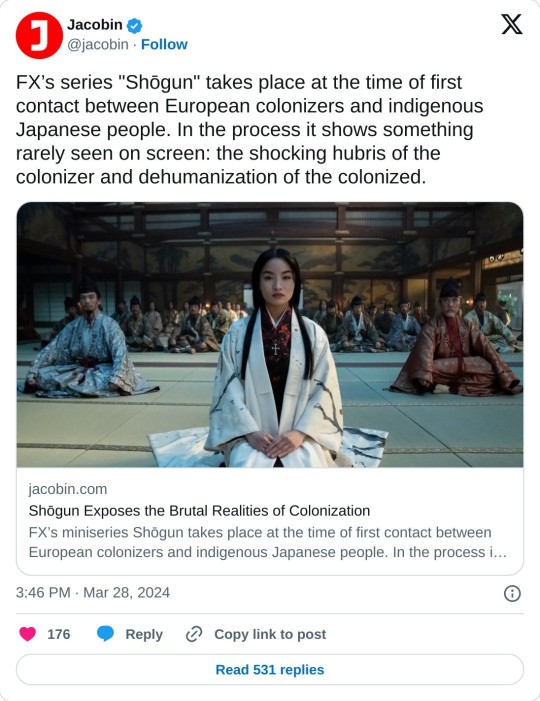
Maybe the “colonizer/colonized” view of the world needs to take a step back. Like, 100 steps back to focus on actual examples of this
Regardless, I will celebrate the day jacobin goes out of business.
28 notes
·
View notes
Text
Bradley Simpson, October 28, 2023
Washington’s commitment to dismissing allegations of mass murder and atrocities carried out by its diplomatic friends was bipartisan and enduring. When Pakistan launched a war in 1971 to prevent the secession of East Pakistan, now Bangladesh, killing hundreds of thousands, President Richard Nixon and Secretary of State Henry Kissinger stood by the Pakistani military and sought to suppress or discredit reporting on the horrific civilian toll, leading to a low-level revolt by US embassy officials in Pakistan. Following the US-backed overthrow of Salvador Allende in Chile in 1973, and again following a US-backed military coup in Argentina in 1976, Nixon and later Gerald Ford administration officials publicly denied contemporary press, church, and human rights accounts of tens of thousands arrested, murdered, and tortured, accusing regime opponents of being pro-communist.
37 notes
·
View notes
Text
BOTD: White-necked Jacobin

Photo: Doug Greenberg
"Rather large, spectacular hummingbird of humid tropical lowlands that favors forest edges, adjacent clearings with scattered trees and flowering bushes, and gardens. Feeds at all levels, often in the canopy, hovering with its tail cocked and occasionally opening it to show extensive white. Male has deep blue hood, green upperparts with white collar (often hard to see), white underparts, and mostly white tail. Some females look similar to males while others look very different, with dark spotting below and a mostly green tail with white tips."
- eBird
#birds#white necked jacobin#birds of north america#north american birds#hummingbirds#hummingbird#jacobin#jacobins#birds of mexico#birds of central america#birds of america#american birds#bird#birding#birdblr#birblr#bird watching#bird of the day#Florisuga mellivora
55 notes
·
View notes
Text
“France is in the throes of violent birth”: Thomas Jefferson and the 1789 French Revolution
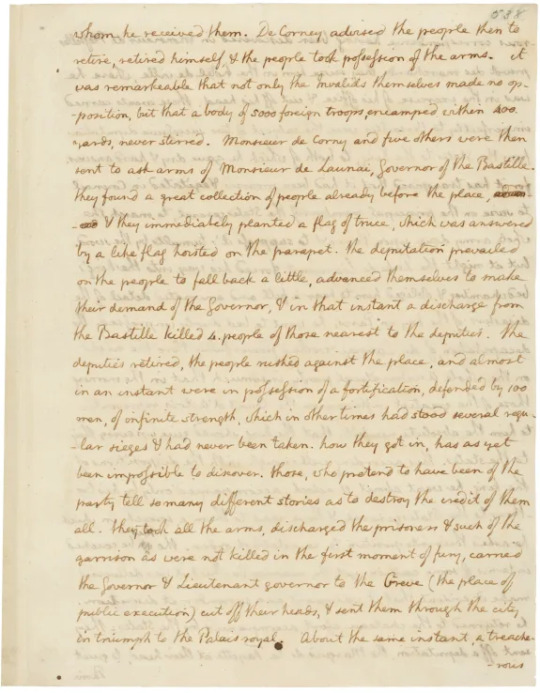
"The deputies retired, the people rushed against the place, and almost in an instant were in possession of a fortification, defended by 100 men, of infinite strength..."
• Ambassador Thomas Jefferson report on the events on 14 July 1789.
The excerpt shown here is from a letter in Jefferson’s own hand to Secretary of Foreign Affairs John Jay. In great depth, he describes the events of July 14, 1789, including the storming of the Bastille in Paris. The Bastille was a symbol of the old regime, and housed arms, gunpowder, and prisoners.
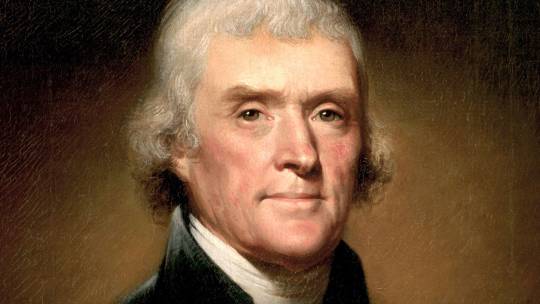
On 14 July 1789, the U.S. Ambassador to France, Thomas Jefferson, was a witness to the events of a day in Paris that is commonly associated with the beginning of the French Revolution. Jefferson recorded the events of the day in a lengthy and detailed letter to John Jay, then Secretary of Foreign Affairs.
The American Revolutionary War began as a conflict between the colonies and England. In time, what began as a civil disturbance turned into a world war drawing France, Spain, and the Netherlands into the hostilities. France would send troops, ships, and treasure to support the American effort. During the war, one of the first priorities of the French government and its allies was to raise funds to fight the war.
When the Treaty of Paris was signed in 1783, France was virtually broke and on the edge of social catastrophe, the result of decades of war with England and other countries. The poor suffered hunger and privation. By 1789, revolution would come to France.

In 1785, Thomas Jefferson arrived in Paris to replace Benjamin Franklin, who was retiring as ambassador to France. At the age of 81, Franklin returned to the United States where he would serve as President of the Pennsylvania Assembly and also participated in the Constitutional Convention of 1787.
John Adams was reassigned to London where he would be the first American ambassador to the Court of St. James. Jefferson remained on duty in France until late 1789 when he returned to the United States. While in France, Jefferson reported on developments at the court of King Louis XVI, the country at large, and the rest of Europe.
Jefferson was sympathetic to the revolution, opening his home in Paris to its leaders and assisting his friend the Marquis de Lafayette with drafting the Declaration of the Rights of Man. As the first Secretary of State under the Constitution and George Washington, his support for France and the revolution continued.
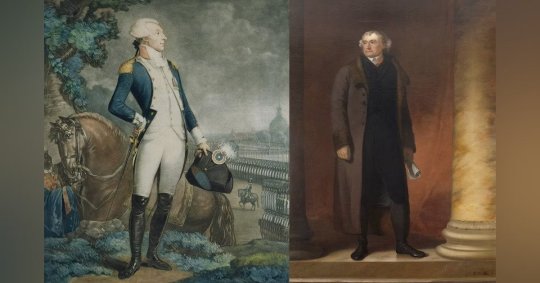
His friendship to the Marquis de Lafayette, who served in the War of Independence and lived almost 10 years in the USA, became very important in the beginning of the French revolution. The Marquis was the General of the french forces 1789 and tried to prevent a civil war and turmoil. He corresponded with Jefferson, who came from a country with the same experiences. Jefferson and the Marquis agreed that France was not mature to become a republic but a constitutional monarchy, like in Great Britain. However, this was the decision of the national assembly, of which the Marquise was a member. Jefferson went daily to Versailles to inform himself about the decisions. During Jefferson’ s visits, they passed the following laws:
1. Freedom of the person by habeas corpus
2. Freedom of conscience
3. Freedom of the press
4. Trial by jury
5. A representative legislature
6. Annual meetings
7. The origination of laws
This totally fit to Jefferson’s principles. In addition, there was passed a bill, which was prepared by Lafayette and Jefferson and which abolish any title or rank to make all men equal.
Thomas Jefferson also helped his friend Lafayette to bring the different opinions in his party about the constitution to an agreement. France should become a constitutional monarchy.
However, after this, Jefferson recognised that he is not allowed to interfere in the French domestic affairs and that he should be neutral and represent his country. He left France in the thinking that the Revolution was over and that France would grow to a constitutional monarchy. Jefferson was proud of the achievements in France and after his return to USA he declared: “ So ask the travelled inhabitant of any nation, In what country on earth would you rather live? - Certainly, in my own where are all my friends, my relations, and the earliest and sweetest affections and recollections of my life. Which would be your second choice? France."
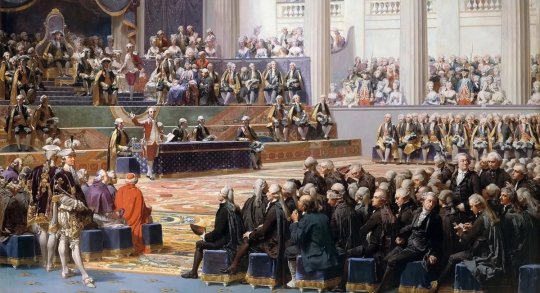
For all his francophile fervour, as the chief American diplomatic representative, Jefferson’s Enlightenment had been a conventionally English one, dominated above all by John Locke. And Jefferson’s first impressions of America’s principal ally in the Revolution were not positive ones. “The nation,” he confided to Abigail Adams in 1787, “is incapable of any serious effort but under the word of command.”
The stars of the French Enlightenment - Voltaire, Diderot, d’Holbach - were frivolous and useful only for manufacturing “puns and bon mots; and I pronounce that a good punster would disarm the whole nation were they ever so seriously disposed to revolt.”
The events of the spring of 1789 soon changed all of that before Jefferson’s very eyes. “The National Assembly,” he excitedly wrote to Tom Paine, “having shewn thro’ every stage of these transactions a coolness, wisdom, and resolution to set fire to the four corners of the kingdom and to perish with it themselves rather to relinquish an iota from their plan of a total change of government” had excited Jefferson’s imagination as nothing before.
Even when the Paris mob seized the Bastille and beheaded the hapless officers of the Bastille, Jefferson shrugged it aside as a mere incident, since “the decapitations” had accelerated the king’s surrender. As Jefferson would write later, “in the struggle which was necessary, many guilty persons fell without the forms of trial, and with them some innocent.” But rather than seeing the French Revolution fail, “I would have seen half the earth desolated. Were there but an Adam and an Eve left in every country and left free, it would be better than as it now is.”

Jefferson’s admiration for the French Revolution seemed to increase in direct proportion to his distance from it. And once he returned to America at the end of 1789, one of his chief motives for taking the post of Secretary of State was to observe and encourage the French eruption, when the National Assembly seized and redistributed the lands of the Catholic Church, when the king foolishly attempted to flee France, only to be captured, placed on trial and executed.
And when a Committee of Public Safety began a national purge - the “reign of terror” - Jefferson continued to describe the French Revolution as part of “the holy cause of freedom,” and sniffed that “the tree of liberty must be refreshed from time to time with the blood of patriots and tyrants. It is its natural manure.”
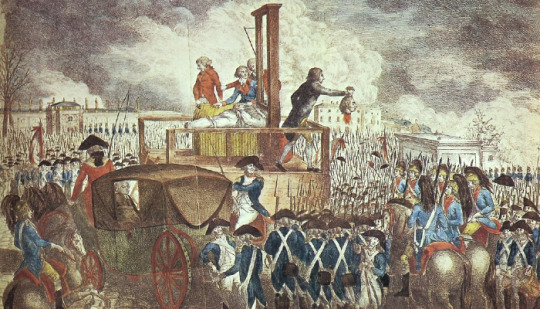
There is no question that Jefferson’s influence in the beginning of the French Revolution was very important. His initial moderate counsels and ideas helped in the beginning to prevent a civil war. His opinion that France was not mature to become a republic is probably right, because after 600 years of monarchy and aristocracy they people were not used to have any rights or take part in political matters. Jefferson thought that a republic had to develop from a constitutional monarchy. When you look to the cruel end of the French Revolution, Jefferson’s assessment was right up to a point.
Jefferson’s time as Secretary of State coincided with the most explosive phase of the French Revolution. What started as an attempt to dismantle the Ancien Régime and institute a constitutional monarchy blossomed into a radical experiment in creating an entirely new republican society. As his correspondence with Minister to France Gouverneur Morris and Minister to the Netherlands William Short during the emergence of the Jacobin Terror reveals, Jefferson responded to the violent radicalisation of the Revolution with enthusiastic support.
His advocacy for the French Revolution did not signify his emergence as a disruptive insurrectionist in favour of purposeless violence, anarchy and unbridled populism. Instead, he advocated for recognition and support of the Jacobin government as a successful international analog to the republican project he wanted to pursue at home at the expense of the “monarchical” aspirations of Hamilton and the Federalists.
In practice, the parallels he imagined between the ideal Jeffersonian and Jacobin republics were usually more apparent than real, as Jefferson often ignored the reports of Morris and Short in favour of fanciful idealising of his French counterparts – a problem Jefferson would only come to grips with in retirement.

Despite these dilemmas, Jefferson’s impassioned advocacy for the French Revolution proved effective, emerging as a cornerstone of the burgeoning Republican Party’s foreign policy and remaining important well into the early nineteenth century, until the Revolution ceased to be an important political issue. It was not until he became President in 1801 that Jefferson’s views toward France began to cool and became more pragmatic, highlighted by the Louisiana Purchase Treaty.
#thomas jefferson#jefferson#french revolution#14 july 1789#bastille day#america#france#french#monarchy#republic#history#politics#ideology#jacobin#essay#diplomacy#ambassador#jefferson in paris#paris
59 notes
·
View notes
Text
BOTD: White-Necked Jacobin

^Image credit: Charles J. Sharp
White-Necked Jacobin (Florisuga mellivora)
The White-Necked Jacobin was first described in 1743 by the English naturalist George Edwards in A Natural History Of Uncommon Birds. He used the name 'white-belly'd huming bird'. It is typically seen high in trees, but flies lower at forest edges and clearings.
#white-necked jacobin#white necked jacobin#jacobin#hummingbirds#hummingbird#florisuga mellivora#birds of mexico#birds of central america#birds of brazil#birds of peru#birds of bolivia#tropical birds#bird taxonomy#birding#bird facts#bird fact#bird#birds#bird of the day#ornithology
83 notes
·
View notes
Text
Every day I learn about another fucking American war criminal that fucked the lifes of millions of people around the world and got to live a nice long life and die peacefully *slams head against wall*
11 notes
·
View notes
Text
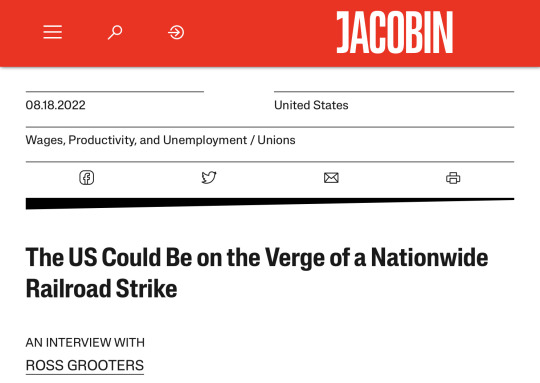
The US Could be on the Verge of a Nationwide Railroad Strike
Jacobin, August 18, 2022
Ross Grooters [excerpts]: “In a typical job, you have weekends — so that’s 104 days a year you know you’re not working. We don’t have those. With nineteen years on the job, I’m looking at four weeks’ vacation and eleven personal days. And this is one of the reasons you’re seeing so many people leaving.”
“Increasingly, the railroads are trying to have the workers do more work, faster. The why is capital and profit, and in particular Wall Street speculation. The railroads were viewed as this untapped profit source for venture capital to go in and really tighten the screws. In many ways the lean production that you’ve seen in other industries, like auto, hadn’t yet come to the rails. This is in part because we had some amount of regulation. There was a recognition that it’s an unsafe job and that it takes planning and workers with skills and knowledge to perform this job. At some point, there was a deliberate decision to erode that. In the last six years or so, precision scheduled railroading (PSR) has become the program. It’s a pretty Orwellian term, really. The “precision” is just: how precisely can we cut the business, and in particular labor, to the bone and have it still function? And railroads cut way too deep. We have lost tens of thousands of railroad workers [to layoffs and attrition], and much of that work has gone to subcontractors or smaller switching operations that are in many cases nonunion.”
“The issues vary from craft to craft, but across all crafts, people are fatigued. They’re looking for something that reflects the amount of work that they’re putting in. It’s hard to stomach when you’re being told that you’re not worth more. We’ve been working hard and have made these companies billions of dollars and are being told that we don’t deserve anything from that.”
“And even with the wages, it’s not enough. We are doing more work, with fewer people, faster, and it’s making the companies record dividends and record profits. This PEB recommendation doesn’t reflect that.”
“Based on what I’m hearing people say about the recommendations, my expectation is that people will vote no. The question is whether there will be enough turnout to show unanimity in opposition. And it’s my job and fellow union members’ job to get people out to vote on it. Here’s the way I see it: we either continue to accept what we’re being handed by rail carriers through a very limiting and archaic process with the Railway Labor Act (RLA), which constrains our ability to take on-the-job action, or we decide to take a stand. I’ve had more conversations with people across crafts and unions and states during this round of bargaining than ever before. I think we need to keep doing that and organizing, so that, whether now or in the future, we’re ready to take action.”
“I think [a rail strike] have an even bigger impact today, because of the state of the rail industry and how carriers have damaged themselves. It’s certainly more fragile today than it was five or ten years ago. We transport what are called “shutdown cars,” which means that there’s some commodity or product in there that if it does not get delivered, that business will shut down. Those people will be sitting there with nothing to do. And some of that happens today under normal operations but happening all over the country all at once — I can’t even begin to get at all of the effects. Additionally, I’ve got to believe that it would have ramifications for other groups of workers as well. This is one of the reasons the RLA exists and limits our ability to go on strike — because strikes could have something of an infectious effect and spread outside of rail labor.”
143 notes
·
View notes
Video
White-necked Jacobin Hummingbird by Chris Bainbridge
Via Flickr:
Not quite sure where the name comes from, but the Jacobins were the most radical and ruthless of the political groups formed in the wake of the French Revolution, and in association with Robespierre they instituted the Terror of 1793–4. They often wore blue ex-military coats - maybe from there? :-) Taken in Costa Rica (at Rancho Naturalista). You don't want to know how many out of focus shots of these birds I took to get one half decent one.
9 notes
·
View notes

